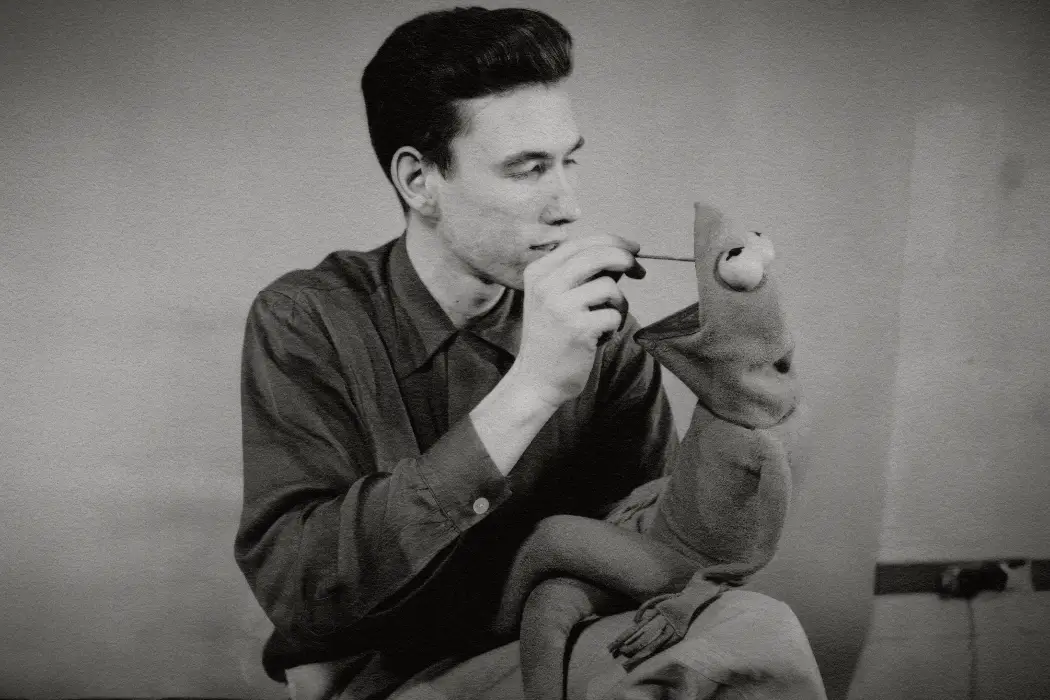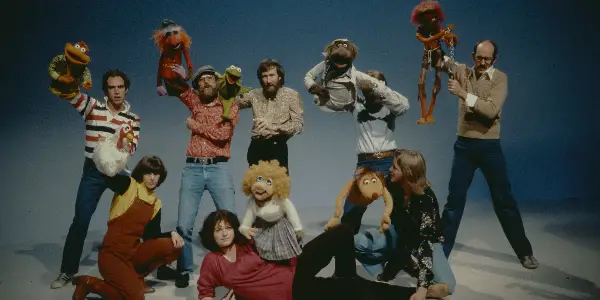JIM HENSON IDEA MAN: Basic Jim Henson Doc Sticks To The Script

Film critic, Ithaca College and University of St Andrews graduate,…
I’d like to begin this review by stating that, for the record, I am anti-puppet. I find them neither charming nor funny. They are abnormal, hideous creations. God does not smile upon them. Unfortunately, puppets have so worked their way into our national psyche that they continue to have a hold on the hordes of unimaginative pencil-pushers in Hollywood and in marketing in general. From that loathed Melissa McCarthy cop comedy The Happytime Murders to the new leather jacket-wearing punk mascot of LNER, every new puppet project not made for children feels like the Puppet Lobby controlling executives with strings in a bid to stay relevant.
One freak, though, clearly did not share my hatred of puppets. To the benefit of puppeteers everywhere, Jim “Frog Man” Henson started making puppets as a child and then embarked on a lifelong crusade to make puppets incredibly cool. I guess part of that crusade also involved trying to make them sex symbols — Jim Henson Idea Man features at least three clips where Sir Roger Moore, one of the most handsome men of the 1970s, flirts with Miss Piggy in a luxury hotel suite, and various talking heads throughout the doc tell us how Miss Piggy was propelled into the status of sexual icon.
Jim Henson Idea Man, the most confoundingly unpunctuated title since Eat Drink Man Woman and Gas Food Lodging, is as basic a hagiography as you can imagine. Henson, of course, worked with puppets all his life and created The Muppets Show and Sesame Street — his story is framed as that of an underdog against the system, and his career is wide-reaching enough to warrant a film. It’s about as appraising as Henson deserves and half as insightful as it ought to be. The film, written by that master of serviceable fluff Ron Howard, throws the frog man under a magnifying glass and interviews his former coworkers to get the most banal soundbites possible. It’s the story of the man behind the Muppet empire, basically from womb to tomb. It traces his childhood through his college days and his early work in television, then hurdles headlong through the Muppets and Sesame Street all the way up to his funeral. Puppet-haters like me will gain a newfound respect for the artform by the end of the film, and Muppet fans will get about an hour and 40-some minutes to relive the glory days, when The Muppet Show was one of the hottest things on the air and Sir Roger Moore tried to hook up with a puppet on television.
Jim Henson Documentary Subject
As a documentary subject, Henson is a logical pick. Our current documentary age is one in which you can’t get funding for a film — much less get distribution — unless it’s a biography of a famous person. That’s why the past decade has seen a flood of biographical documentaries, from RBG and Won’t You Be My Neighbor? to more high-brow fare like Free Solo and Navalny. Most of those documentaries either struck when the iron was hot, so to speak, and many of them also premiered within a few months of a fiction treatment of the same subject. Within a year of the Ruth Bader Ginsburg and Fred Rogers documentaries, Hollywood gave us Felicity Jones and Tom Hanks in those roles on the big screen. Jim Henson Idea Man fits all the criteria of a modern documentary: Not only is biography its sole purpose, but you can also see him played by Nicholas Braun in Jason Reitman’s Saturday Night.

Jim Henson Idea Man therefore becomes another title available to streaming crowds, less a work of art or an insightful study of a creative mind and more a safe release intended to boost subscriber numbers and company value. IndieWire and Videomaker have both described the dire state of current documentary filmmaking better than I can in a review of the puppet man documentary. The tl;dr is that nowadays, documentaries are seen as content more than art, and the executives commissioning and purchasing films believe that documentaries about famous people will always sell better than other nonfiction work.
I suspect the only reason this movie exists is because all of the producers behind it and Ron Howard himself grew up watching The Muppet Show on television, and Hollywood executives cannot imagine anything being interesting if it is not a part of their own life experience. That would explain the lack of insight the film provides. There are no grand revelations in Jim Henson Idea Man, other than the milquetoast suggestion that Henson wasn’t a great dad. For purists, the film’s producers unearthed some old commercials Henson created with his original Muppet creations, commercials that were thought to have been lost. Aside from that admittedly worthy archival digging, the film fails to reveal anything interesting about its subject and seems to have nothing to say about his art. I’m not surprised — there’s no way that Ron Howard, the man who adapted the J.D. Vance book for Netflix and made three Dan Brown movies, is capable of making a version of this movie that isn’t safe, inoffensive, and slight. This is pablum from start to finish.

The best trick Howard has is to cherry-pick the best scenes from The Muppet Show and play them back to us. Some of those moments are well-chosen and do their job. One scene, in which Kermit tries to teach a little girl the alphabet, is so effective that it made me cry, and then I rewound the film, showed the clip to my wife, and then we both cried. Howard even puts some somber musical notes underneath the alphabet scene so you really know you’re supposed to cry. If emotional manipulation is all you want in a documentary, then bang-on, you’ve found Jim Henson Idea Man. If you want a documentary about the Muppets that digs deeper, check out the 2021 Sundance favorite Street Gang: How We Got To Sesame Street.
Conclusion
Ron Howard has two main artistic devices in Jim Henson Idea Man, other than the usual talking-head model. The first comes within the film’s opening minutes — it’s an interview Henson did with Orson Welles, which is, again, neither funny nor insightful. It’s a crude, condescending attempt on Howard’s part to establish that Henson is a legitimate artist and that we should take him seriously, as if saying, “The director of Citizen Kane thinks this man is a great artist! So should you!” It’s as though Howard is trying to pitch the film to us as we’re watching it.
The second artistic device Howard uses is to occasionally veer into abstract imagery. Real simple stuff — dotted lines and scribbles and blocks. The film’s description of Henson’s surreal, abstract art suggests that this is an attempt to create parts of the film that can act as tribute to Henson. But it’s lazy and derivative. Every artistic feat Henson accomplishes throughout the film only makes Howard’s film’s attempts at abstraction seem silly, vague, and undeveloped. Jim Henson Idea Man is not just insubstantial as a documentary — it’s a rare example of a subject being so big, so artistically daunting, and so creative that he outgrows his own documentary. This is less a tribute to a deceased artist and more Ron Howard and a team of editors, animators, producers, and sound mixers trying desperately for 100 minutes to lasso a leviathan.
Jim Henson Idea Man is now streaming on Disney+.
Does content like this matter to you?
Become a Member and support film journalism. Unlock access to all of Film Inquiry`s great articles. Join a community of like-minded readers who are passionate about cinema - get access to our private members Network, give back to independent filmmakers, and more.
Film critic, Ithaca College and University of St Andrews graduate, head of the "Paddington 2" fan club.













